The Porsche Taycan Sharpens Its Case

Mid-life facelifts are normally about surface changes to freshen up a car rather than deep mechanical alterations. Porsche has reversed that trend with the new Taycan. Design tweaks are close to blink-and-miss-them. The narrower new headlights are the only ones that really stand out from more than about a dozen feet. But beneath the surface the Taycan gets a serious powertrain makeover that includes new batteries plus a lighter, punchier new motor. Air suspension has become standard, and there is also the option of a very clever electro-hydraulic active ride system.
Many of the changes made to the electrical system have been to intended to improve the Taycan’s range, the one area where the original car obviously lacked when compared to rivals. We don’t have EPA numbers yet, but on European WLTP figures every version of the Taycan that carries the larger 97 kWh Performance Plus pack has seen its official range improve by more than 100 miles. Even the entry level rear-drive version with the smaller 82.3 kWh battery is now rated for 366 miles in Europe.
We’ll take that on trust for now. The press drive in Spain gave the chance to drive multiple examples of the new Taycan, but none for anything like long enough to deplete its battery pack. With a route that included the same spectacular mountain roads on which we recently sampled the third-gen Porsche Panamera, efficiency was rarely a priority given the more compelling opportunities to experience the Taycan’s performance on sinuous, empty asphalt.
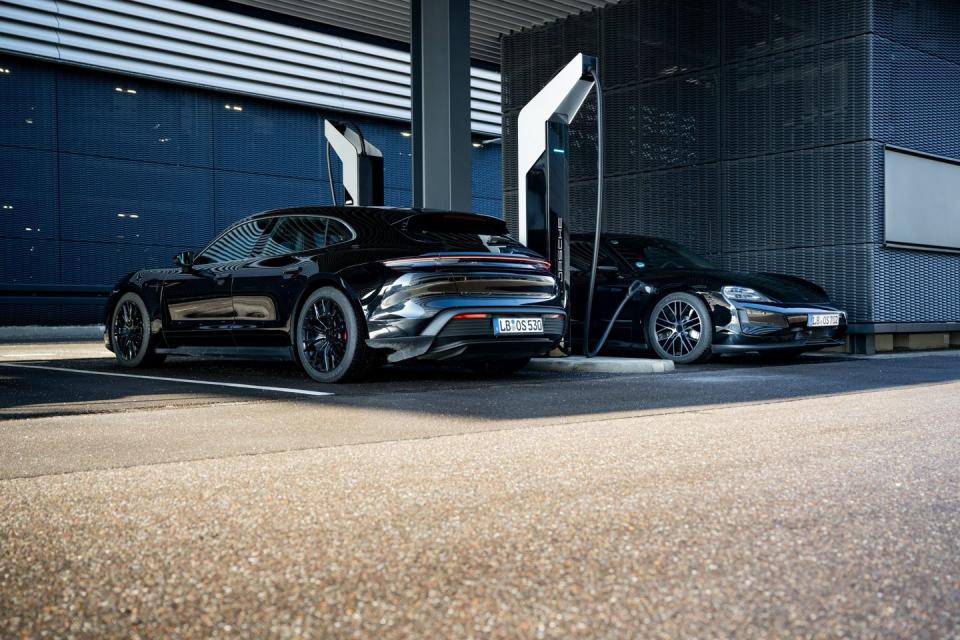
Nor did I personally put the claimed peak 320kW DC charging speed to the test, although I did see the cool semi-trailer packing no less than 2.1 megawatt/hours of storage which Porsche was using to fast-charge up to eight Taycans at a time at rates of up to 250kW.
The Taycan RWD Gets More Resolved
Every new Taycan variant has become quicker than the version it replaces. Although the biggest percentage power increases are at the top of the range, the most significant subjective change is the one that has been made to the entry-level Taycan RWD. Peak output barely changed -- 402 hp with the regular battery, 429 hp with the Performance Plus pack -- but the full total is now available across the board, while the last RWD reserved its peak for launch control. The outgoing car also always felt very much like a base model, slower and much less exciting than its punchier sisters. The new RWD is still definitely the least-fast model in the range, but improved responses and what seems like a much smarter motor control algorithm means it feels much punchier. Porsche claims a 0.6-second improvement on 0-60 mph time, which falls to 4.5 seconds. The limitation of a single driven axle is still obvious in tight corners, where the rear-driver has to struggle for the traction that comes easily to its all-wheel driven siblings.
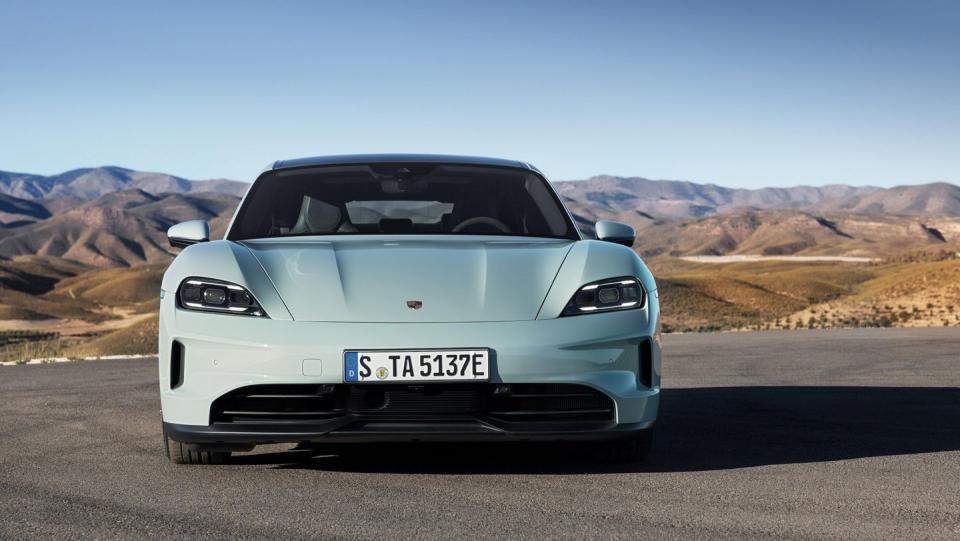
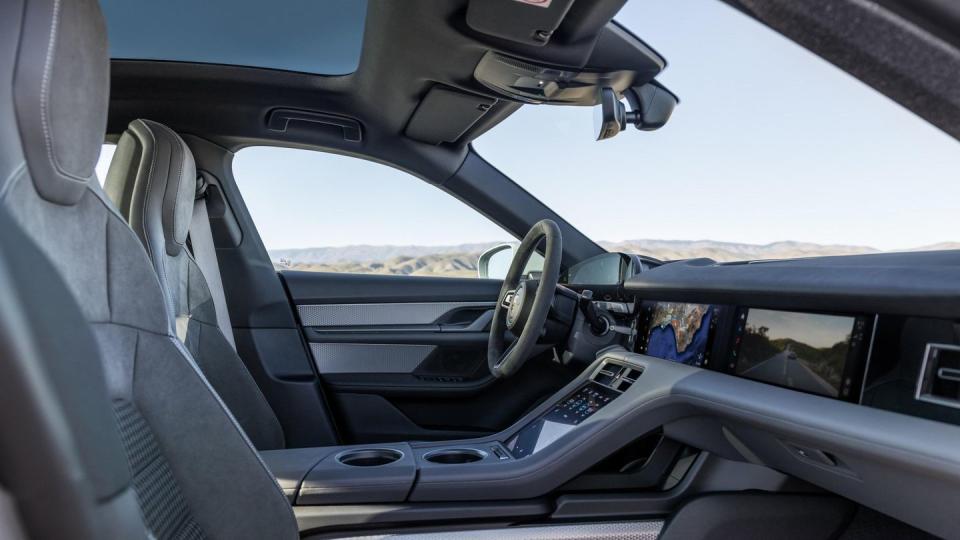
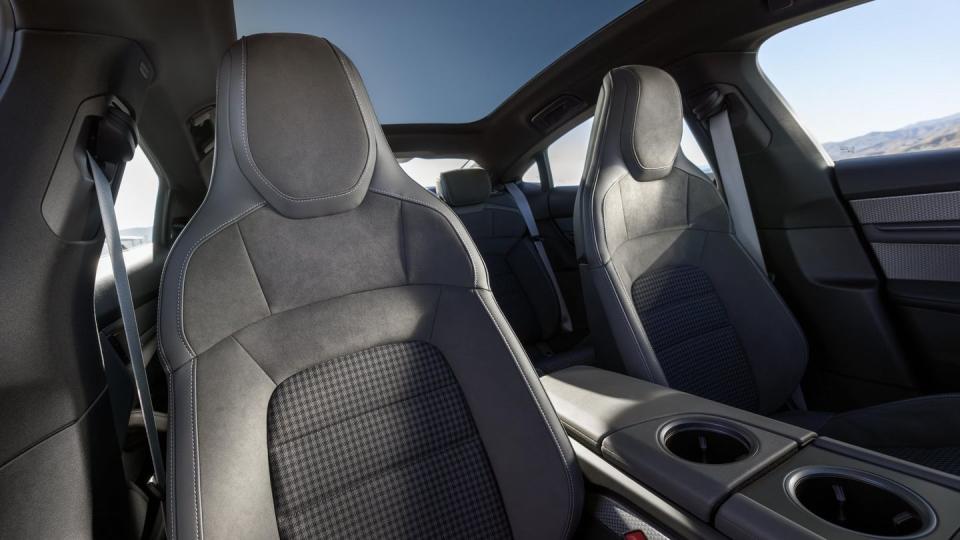
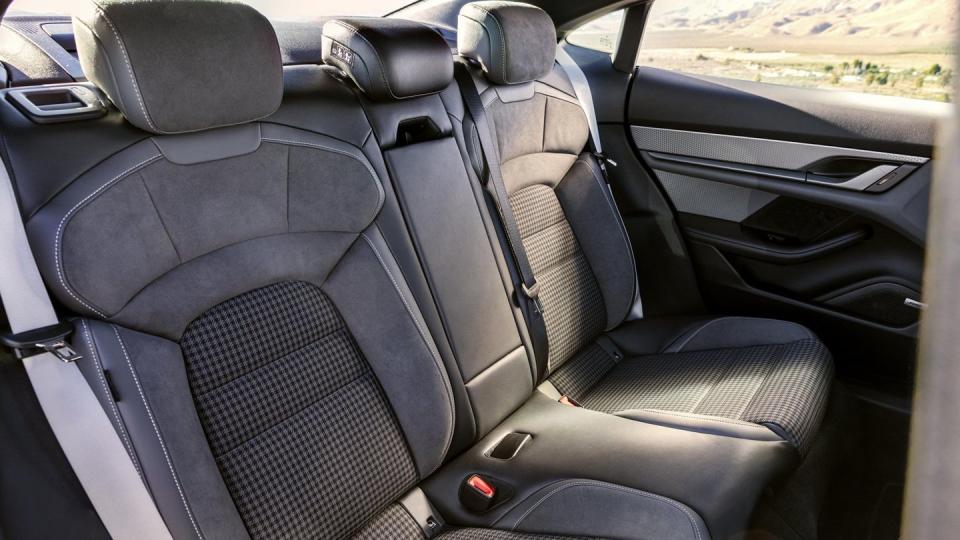
The sole RWD Taycan in Spain was also the only way to experience a car on the regular suspension, and without fancy features like a torque-vectoring rear differential or rear-axle steering. The combination of now-standard air springs and two-valve adaptive dampers combined plush isolation from bigger imperfections with tight body control when ordering rapid directional changes. The lowness of the Taycan’s mass remains its defining dynamic characteristic, helping it to corner without roll despite what is fairly soft initial springing. Steering also remains excellent: direct, proportional and with discernible off-center feel. Even in its most basic form, the Taycan remains one of the best-handling EVs in the world.
The 4S Might Be the Goldilocks Taycan
But although it serves a purpose, the RWD Taycan will almost certainly remain a minority choice. Porsche has long been masterful at incremental marketing, with carefully constructed model hierarchies that dangle enough from each rung of the ladder to persuade buyers to keep climbing higher. In the case of the revised Taycan, that has created a top-heavy range with no fewer than three Turbo-branded variants. Beneath them, the Taycan 4S makes a compelling case as the sweetest spot in the clan, even if performance improvements over the old 4S are slight.
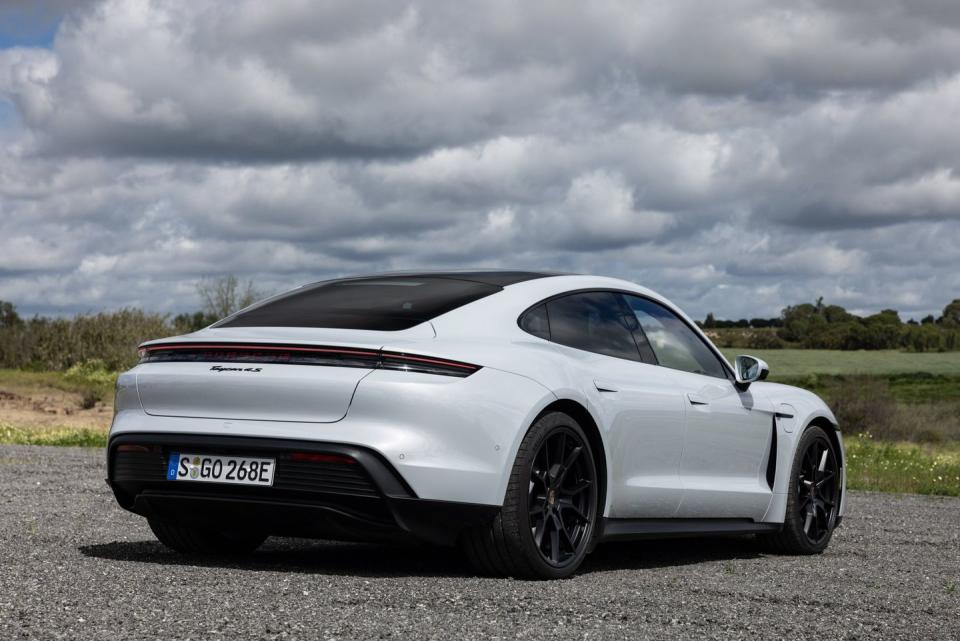
As with the RWD, the Taycan 4S has different peak figures depending on which of the batteries it picked with. For the regular pack, the peaks are now 455 hp and 536 hp overboost -- increases of 26 hp and 14 hp, respectively. With the new Performance Plus battery and those numbers rise to 509 hp and 589 hp, rises of 27 hp and 26 hp. Porsche now claims a 3.5-second 0-60 mph time and a 7.8-sec 0-100 mph time. That, let’s be honest here, fits most people’s definition of ‘seriously quick,’ despite being less than half way up the range.
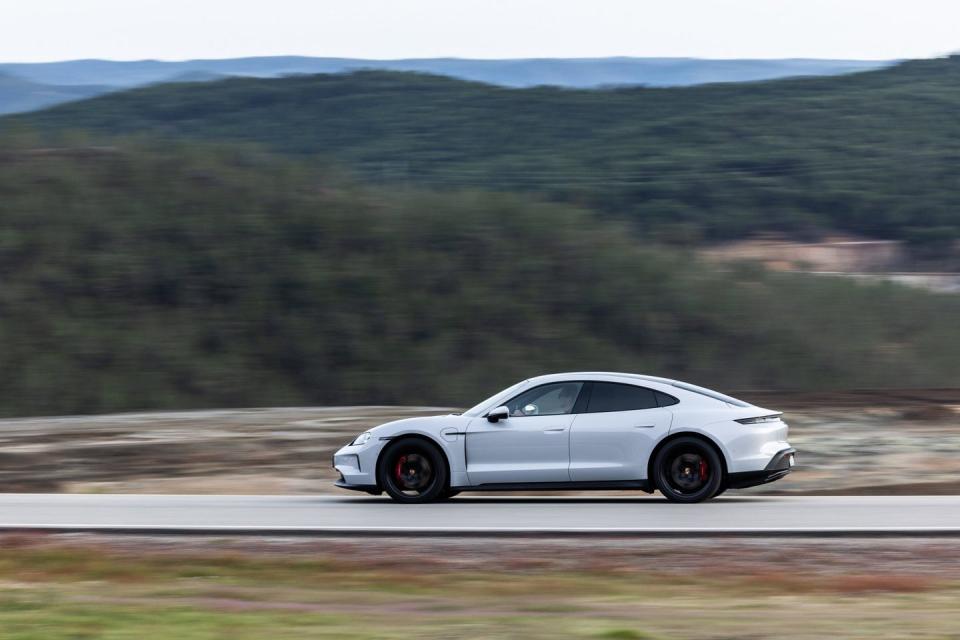
The 4S feels every bit as punchy as those figures suggest it should; as with every other Taycan - there is a complete lack of delay or hesitation in the way it reacts to the accelerator pedal. Without the need to build turbo pressure, or kick down gears, the Taycan just goes: electric horses really are keener than gas-fed ones. The 4S’s ability to send effort to both axles also delivers huge traction and a high sense of dynamic security. You can push it to the point at which grip starts to fade in tighter corners, but on faster sweepers it just grips and goes. This is a car that can put impossible-looking numbers onto the speedometer without the driver feeling as if they are pushing too hard or taking liberties. Important note: This excuse won’t be accepted by law enforcement officers.
Active Ride Is Even Better Than in the Panamera
The 4S also gave the chance to experience the smart new Active Ride system. In the U.S. this will be a $7140 option offered on every car in the range apart from the RWD, the basics being near identical to the system fitted to the third-gen Panamera we drove last month. Active Ride uses a high-voltage pump to create pressure that can be used within the dampers to counter body motions, reducing roll under cornering loads and pitch and dive under acceleration and braking.
The new system works brilliantly, even better than it does in the Panamera, because the Taycan’s weight sits lower and more of it is within the car’s wheelbase. Over rougher surfaces Active Ride works to minimize disruption and to keep the body flat and level, but without losing the sense of connection to the road or turning the car numb. It does bring a sensory disconnect as you see a bump approaching only for the resulting motion to be much smaller and gentler than the one your brain has warned you to expect. Active Ride also brings the ability to over-compensate for the car’s movements, raising the outer suspension in a turn to reduce apparent G-forces and pushing up the front under braking or the rear under acceleration. These functions all felt much more subtle and natural than they did in the Panamera, although my takeaway was that Active Ride is better at removing sensation than adding it.
Taycan Turbos Are Uncomfortably Fast
For those in search for more shock and awe, there is now the choice between Turbo, Turbo S and Turbo GT. I’m not allowed to tell you about what the GT is like to drive yet, Porsche holding impressions for another week. But I can confirm that both of the lesser Turbo variants already offer the ability to deliver what are genuinely uncomfortable longitudinal Gs.
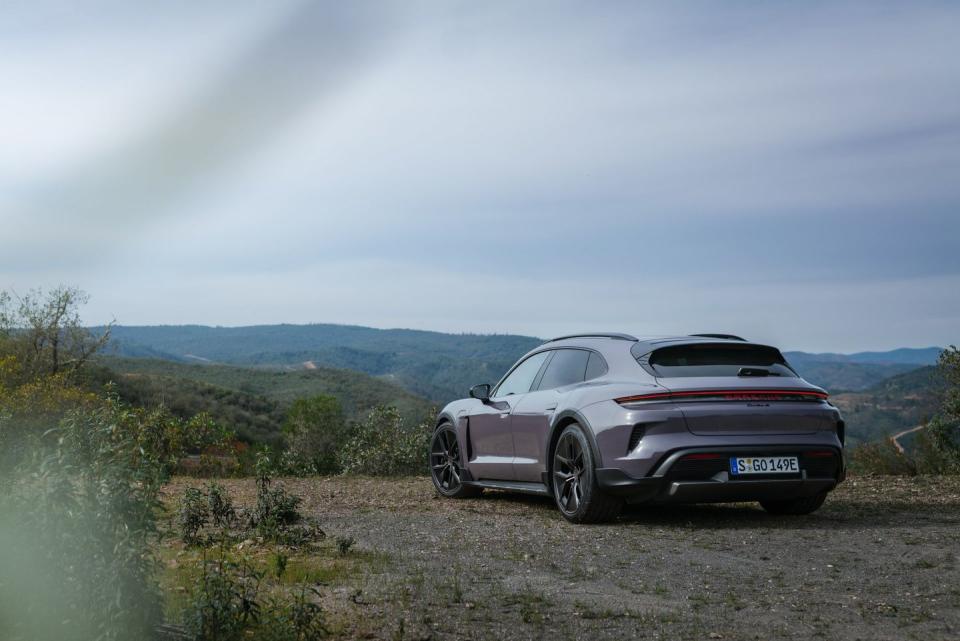
While that was true for the outgoing Taycan, Porsche has increased power outputs further. The Turbo’s everyday peak is now 697 hp and the Turbo S’s 764 hp, but with a new Push to Pass button on the steering wheel increasing output by another 93 hp for up to 10 seconds (with a countdown timer to show how long remains.) Yet even that isn’t everything - selecting the Launch Control mode brings the output of the Turbo to 871 hp and the Turbo S to 938 hp. On Porsche’s numbers the Turbo S has a 2.3-second 0-60mph time and a 5.2-second 0-100mph time. Figures which are pretty much identical to those of the Bugatti Veyron over the same increments.
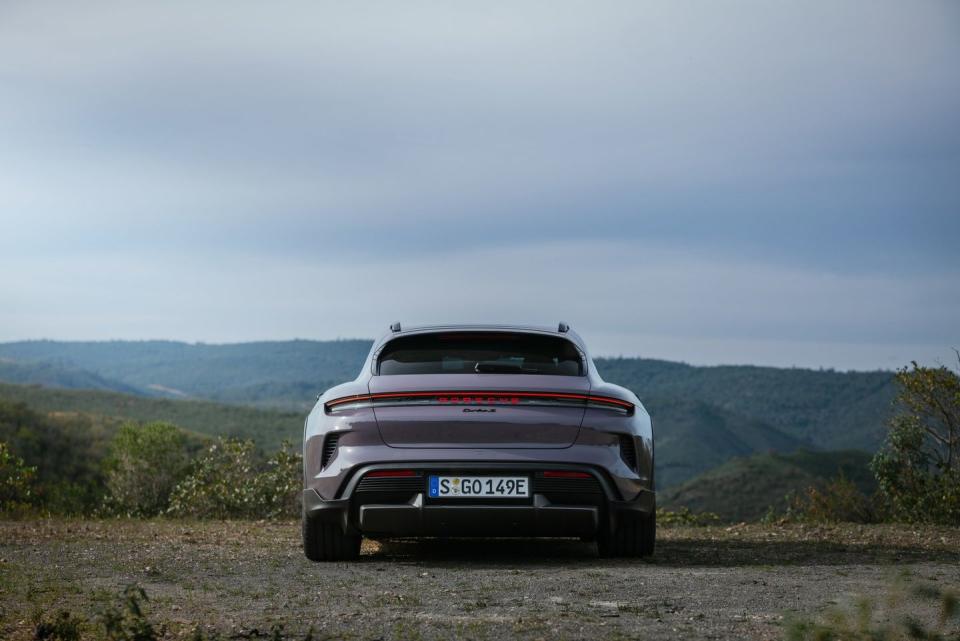
I didn’t attempt to match those numbers on a Spanish public highway, or get anywhere close to them. I only pushed the Push to Pass button once to confirm its ability to relocate internal organs; it’s all a question of how much too much you actually want. The secret of the Taycan Turbo remains as before: the huge performance doesn’t actually bring other significant compromises beyond a small reduction in range over the Performance Plus 4S. It also doesn't quite bring the need to find the considerable supplement necessary to pay for it. For all its ability to deliver brutal, instant speed, the Turbo remains as relaxed as its cheaper siblings when cruising.
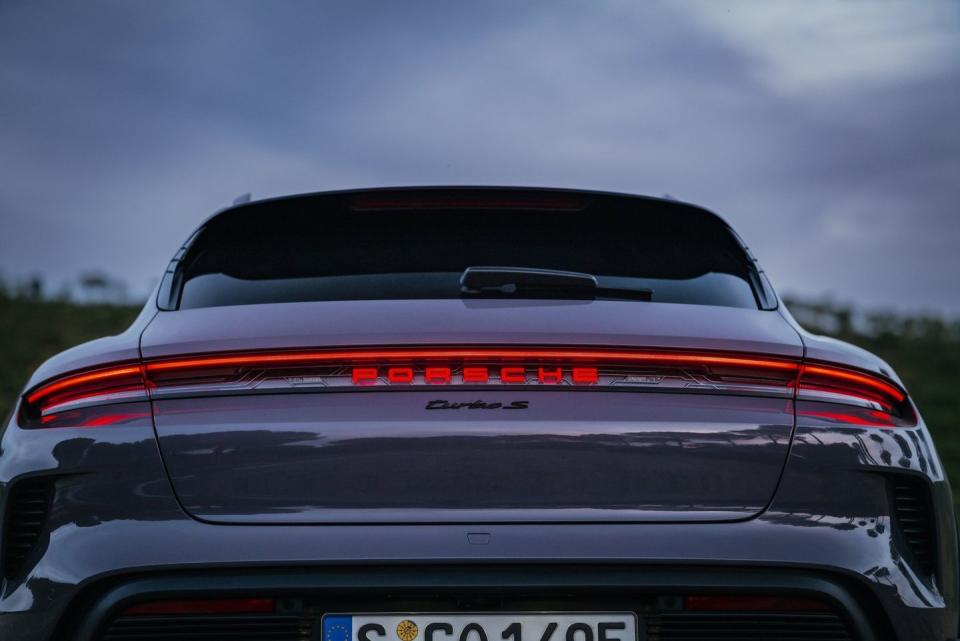
One surprise is the continued lack of obvious regenerative braking effect, despite the fact that Porsche has increased the peak recuperation ability from the equivalent of 390 hp to 536 hp. There still isn’t a one-pedal drive mode, and even the more aggressive of the two switchable regeneration modes delivers only gentle slowing when the accelerator is lifted. Fortunately the brake pedal’s weight and travel feels entirely natural, it is impossible to tell how much of its work is being done electrically and how much by friction.
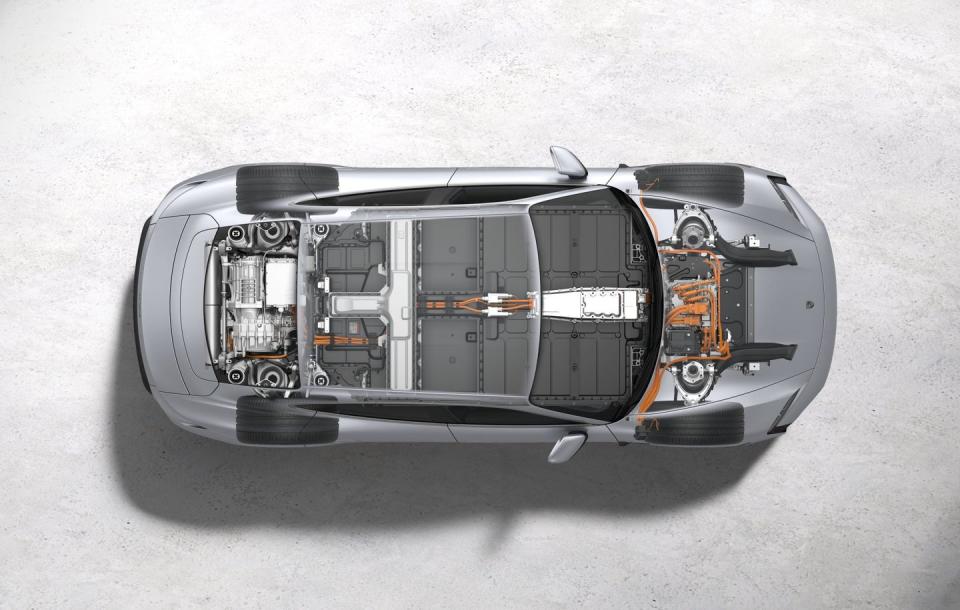
Prices have risen alongside performance. The base rear-driver is now $101,395 - nearly $10,000 more than the pre-facelift car. The Taycan 4S starts at $120,495, the Turbo at $175,595 and the Turbo S is $210,995 - that’s for the sedans, the wagon-ish Cross Turismo carrying a $7000-ish supplement depending on trim. Beyond these mortal grades the 1020 hp Taycan Turbo GT will be a cool $231,995.
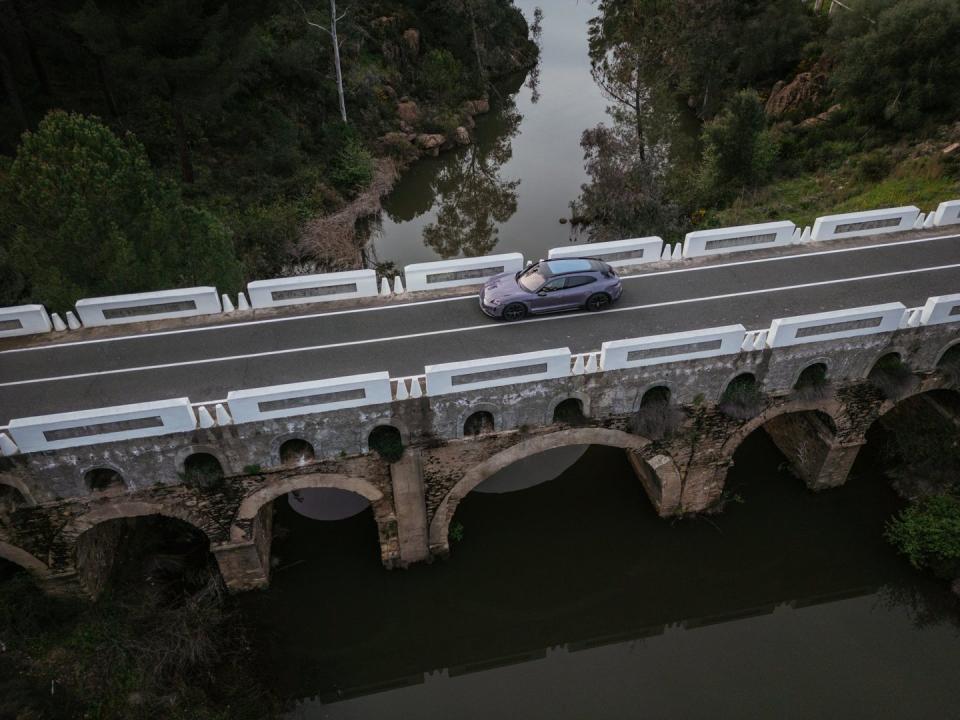
Even after four years, the Taycan didn’t need to change by much to stay on top of the pile, and it hasn’t. Enhanced range aside, and the arrival of the Active Ride option, pretty much everything else is window dressing. Or, in the case of the new third screen the driver can’t see to allow a passenger to stream video, window hiding.
But overall we would be surprised if the Taycan doesn’t remain our favorite EV for a good while longer.
You Might Also Like


